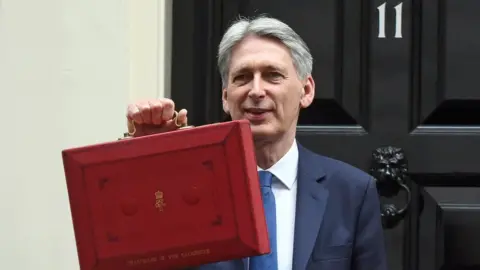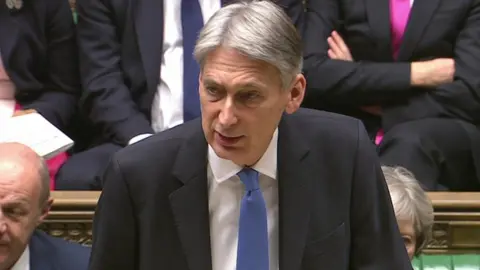Budget 2017: £540m extra for NI infrastructure
 BBC
BBCNorthern Ireland will get an extra £540m to spend on infrastructure over the next four years as a result of the Budget.
Day-to-day spending will also increase by £120m, a reduction in real terms when inflation is taken into account.
For day-to-day spending to remain unchanged in real terms in 2018/19, there needed to an additional allocation of £162m.
However, the additional allocation for next year is £63m.
The Secretary of State said that overall it means the Northern Ireland block grant will increase in real terms over the Spending Review Period between 2015 to 2020.
Much of the additional infrastructure spending - £375m - takes the form of what is known as Financial Transactions Capital (FTC).
FTC differs from normal capital spending, taking the form of a loan or investment in a private sector project.
In the past Stormont departments have had difficulty finding suitable FTC projects, though a Northern Ireland investment fund has been established to help make better use of this money.
Chancellor Philip Hammond also announced a consultation on a city deal for Belfast.
This would allow the city to have powers to create economic growth, help businesses grow and decide how public money should be spent.

Spending for Northern Ireland is largely determined by the operation of the Barnett Formula.
In crude terms, the formula means that if spending falls or rises on public services in England, it will also change by a proportionate amount in Northern Ireland.
The chancellor said that if pay rises for nurses are recommended by an independent body, there will be new money.
Allow X content?
However, the situation in Northern Ireland is complicated by the current lack of devolved government.
The region has been without a devolved administration since January, when the governing parties - the DUP and Sinn Féin - split in a bitter row over a botched green energy scheme.
Northern Ireland public sector pay is a devolved issue and there are currently no ministers to sign off on increases.
Reacting to the announcement of a consultation on a city deal for Belfast, SDLP leader and Foyle MLA Colum Eastwood has said it is "a disgrace" that Mr Hammond did not announce a similar city deal for Londonderry.
"For too long Derry and the North West has been treated like the poor relation. Like second class citizens and we aren't taking it," he said.
Allow X content?
The government committed to looking at the issues as part of the DUP's £1bn confidence and supply deal to keep Theresa May in Downing Street following the general election.
DUP Treasury spokesman Sammy Wilson welcomed the measures contained in the budget: "It reinforces the relationship which we now have with the government and are pleased that that influence has enabled us to deliver for the people in Northern Ireland."
The MP for East Antrim said: "The way forward on city deals, which will be of immense benefit to local council investment plans, also opens up opportunities for the whole of Northern Ireland."
'Further crisis'
Ulster Unionist finance spokesman Steve Aiken said that Northern Ireland would not see the benefit of several aspects of the budget, such as a reduction in business rates or the likely increase in pay for health workers.
"With no local executive in place, public services across Northern Ireland continue to edge towards further crisis. Vital strategic decisions are not being taken regarding our health service, our education system and our economy," the South Antrim MLA said.
Stephen Farry of Alliance said the extra money should be used to "drive transformation" rather than push difficult decisions down the line.
"In the absence of reform, Northern Ireland's costs are spiralling out of control and any new money must be carefully invested to drive transformation rather than simply plugging short-term gaps," the party's economy spokesman added.
Northern Ireland's budget for 2017-18 was published last week, and shows an increase in health spending of 5.4%.
NI Secretary James Brokenshire said he regretted having to bring the budget to Westminster, but said public services would begin to run out of money if the budget was not in place by the end of November.
